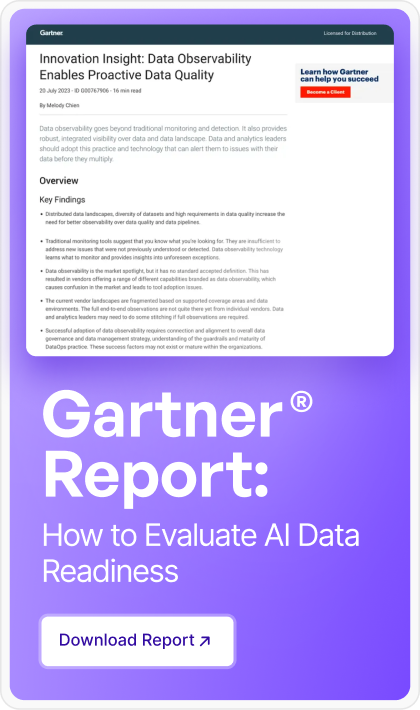Imagine trying to navigate a ship with a broken compass—you might reach your destination eventually, but not without costly errors and wasted resources. Now, think of your business data in the same way. With poor data quality, companies lose an average of $12.9 million per year. These are not just lost dollars but also missed opportunities, declined customer trust, and a weakened competitive position. As businesses increasingly depend on data-driven strategies, you need to ensure that your data is accurate, reliable, and valuable becomes a critical element for success. In this blog, let’s explore how high data quality leads to better decision-making, operational efficiency, and competitive advantage.
What Is Data Quality?
Data quality refers to the degree to which a dataset is accurate, reliable, and valuable for decision-making. While many organizations collect huge amounts of data, not all of it serves a meaningful purpose. High-quality data helps businesses generate accurate insights, predict trends, and improve operational outcomes.
For better understanding, consider a healthcare provider that uses patient data for diagnosis and treatment planning. Inaccurate or outdated data could lead to medical errors, delayed treatments, and even life-threatening situations. However, with high-quality data, healthcare professionals can make real-time, informed decisions to improve patient outcomes. The significance of data quality extends to every industry, from retail to finance.
Data quality vs. data integrity vs. data profiling
It is very important to understand how data quality connects to other vital data concepts like data integrity and data profiling. These terms are often used interchangeably and play distinct roles to make your data not only accurate but also reliable and consistent throughout its lifecycle.
Data quality ensures that the data meets necessary standards, and data integrity ensures that data is complete, consistent, and reliable across its lifecycle. Data profiling is the process of examining data to understand its structure and content and remove quality issues in the early stage.
Key Dimensions of Data Quality
To understand the data quality better, it is important to discuss its key dimensions. Each of these dimensions contributes to the overall value and reliability of data. Let’s discuss them in detail:
- Accuracy: Accuracy ensures that data accurately reflects real-world entities or events. In healthcare, for example, incorrect patient records like wrong medication dosages can lead to serious medical errors. Accuracy is measured against trusted sources through manual checks or automated validations. It helps organizations to make informed decisions and enhance performance.
- Completeness: It refers to the extent to which all required data fields are populated. For example, if we talk about retail, incomplete customer information, such as missing emails or phone numbers, can affect marketing strategies. Completeness is measured by calculating the percentage of missing fields in a dataset. It allows businesses to create accurate reports and improve customer segmentation.
- Consistency: Consistency means that data remains uniform across different systems. For example, a customer's contact information should be identical in both CRM and billing systems. Inconsistencies can lead to inefficiencies in several operations, so consistency is measured by comparing records across various databases to identify discrepancies.
- Validity: Validity checks if data follows the predefined rules or formats. For example, a valid email must include an "@" symbol and a domain. Validity is validated through data validation rules, which ensure that data meets expected formats. To ensure the validity of data, it is essential to reduce errors and maintain data integrity.
- Timeliness: It guarantees that data is up-to-date and available for decision-making. In stock trading, real-time market data is important as delays can result in serious financial losses. Timeliness is measured by the interval between data creation and its availability, helping businesses respond swiftly to changing conditions.
- Uniqueness: Uniqueness ensures there are no duplicate records in a dataset. For example, a marketing agency with duplicate customer records may send repeated outreach messages, which can affect the business. Uniqueness is measured by identifying and eliminating duplicates. It enhances customer relationships and ensures accurate reporting.
Failing to meet these dimensions can lead to inefficiencies and lost revenue. For example, duplicate customer records in a CRM system can result in inaccurate reporting and missed sales opportunities.
Why Data Quality Matters
You need to ensure that your data is of good quality, as it is crucial for businesses. It influences various areas of success. Incorrect data not only results in losses, as in the case of Unity Technologies' $110M Ad targeting Error but also a lack of trust and affects the company’s reputation. Let’s now discuss several reasons why data quality matters a lot:
- Better Decision-Making: Accurate and reliable data leads to informed decisions that drive business growth. For example, data quality allows businesses to refine marketing strategies based on customer behavior, leading to higher engagement.
- Operational Efficiency: With high-quality data, businesses can automate processes and improve workflow and it also reduces manual interventions. This leads to improved productivity and cost savings.
- Enhanced Customer Experience: With accurate and up-to-date data, businesses can deliver personalized customer experiences, boosting satisfaction and loyalty.
- Compliance and Risk Management: Poor data quality can result in compliance issues, especially in regulated industries like healthcare and finance, where incorrect data may lead to legal or financial penalties.
How Can Businesses Ensure Data Quality?
To maintain high data quality, businesses can implement several strategies as per their need. Let’s discuss the strategies that organizations can use to ensure data quality:
Data quality assessment
Regular audits are important for identifying errors, gaps, and inconsistencies within data sets. By regularly evaluating data quality, organizations can find issues that might remain hidden. It enables organizations to take corrective actions. This proactive assessment not only supports data reliability but also supports accurate business decision-making. For example, a financial institution might conduct quarterly data audits to ensure compliance with regulatory standards. It will significantly reduce the risk of penalties.
Proactive improvement
Organizations should implement processes that address quality issues before they impact decision-making. Utilizing the workflows that continuously monitor data inputs ensures discrepancies are resolved easily. This proactive approach minimizes disruptions and enhances operational efficiency by maintaining a smooth flow of high-quality data. For example, a retail company can use real-time monitoring tools to detect and rectify errors in inventory data immediately, as it can prevent stockouts and overstock situations.
Data governance
A strong governance framework ensures data accuracy, consistency, and accountability across the organization. This involves defining clear roles and responsibilities, setting standards for data entry and maintenance, and establishing oversight mechanisms.
Using AI and ML
Utilizing Artificial intelligence (AI) and machine learning (ML) tools can significantly streamline the detection and correction of data errors. These advanced technologies can analyze vast datasets in real time, identifying patterns and anomalies that human analysts might overlook. By integrating AI and ML into their data management practices, businesses can maintain high data quality with reduced manual effort and increased accuracy.
Choosing the Right Data Quality Solution for Your Organization
Selecting the right data quality solution is important for maintaining data integrity and ensuring your organization's success. Let’s discuss some key factors that you should keep in mind while choosing the right data quality solution for your organization.
Scalability
You should consider whether the tool can grow with your organization's data needs. For example, a rapidly expanding retail company may need a scalable data quality solution to handle increasing volumes of customer and product data.
Integration capabilities
The solution you have chosen should integrate smoothly with existing data management systems and analytics platforms. For example, companies using a mix of cloud and on-premise systems require a tool that can synchronize data across these environments without quality degradation.
Customization
You should look for solutions that can be customized to meet your industry’s specific regulatory requirements and operational needs. For example, healthcare organizations need solutions modified as per the Health Insurance Portability and Accountability Act (HIPAA) compliance to ensure patient data privacy and security.
User-friendliness
You should choose tools that are easy to use and don’t require a high level of technical expertise. This user-friendly approach enables teams across different departments to maintain data quality, reducing the burden on IT teams.
Trends to Track in Data Quality
As businesses deal with an increasingly data-driven market, new technologies are changing the way they manage data quality. Organizations that stay ahead of these trends can improve their data management procedures as it results in better decision-making and operational efficiency. Let's take a look at some of the important trends to keep an eye on:
AI and Machine Learning
Companies are using AI and machine learning to detect anomalies and automate data cleansing processes, which results in enhanced data accuracy and reliability. For example, Cisco, which is a global leader in networking and cybersecurity, used Machine learning to protect the data, provide accurate insights to solve issues
Automation
The usage of automated data quality management is increasing significantly; it has reduced manual intervention, leading to more efficient data handling and real-time updates. According to Gartner, modern data management techniques like automating data management reduces cost.
Self-Service Data Quality
Organizations are starting to allow non-technical staff to take responsibility for data quality, resulting in improved accuracy throughout the company. Companies that provide user-friendly tools and training allow staff from varied departments to monitor and manage data quality, ensuring that it meets the required standards. It not only encourages an accountability culture, but it also reduces response times to data-related issues, resulting in better-informed decision-making and increased operational efficiency.
Choosing the Right Data Quality Solution
When you are selecting a data quality solution, you can consider key factors like:
- Scalability: The solution should grow with your business.
- Integration Capabilities: It must integrate smoothly with your current data systems.
- Customization: The tool should cater to industry-specific requirements like regulatory compliance.
- User-Friendliness: Choose a platform that’s easy to use across departments.
Acceldata offers solutions that meet all these criteria, ensuring that businesses can maintain high data standards as they scale.
Boost Your Data Quality with Acceldata
Acceldata’s platform offers an all-in-one solution for managing and improving data quality. With real-time monitoring, automated error detection, and detailed insights, Acceldata ensures that your data is accurate, reliable, and valuable. It not only helps identify data quality issues but also provides actionable insights that empower businesses to address them proactively.
For example, by integrating AI and machine learning, Acceldata helps businesses uncover hidden anomalies in their datasets, ensuring higher data accuracy and reliability. Additionally, Acceldata’s customizable tools enable businesses across industries to manage their data quality more efficiently, reducing the risk of errors and improving decision-making processes. Want to see how Acceldata can elevate your data quality? Request a demo today and see how Acceldata can transform your data operations!
The Way Forward
Maintaining data quality is more than a technical need; it is a business requirement. Poor data quality can cost businesses millions of dollars, but accurate, dependable, and valuable data can be a powerful asset that drives company success. Organizations can maintain high data quality by using best practices, utilizing the latest tools and technologies, and staying ahead of current developments, allowing them to make informed decisions, optimize operations, and improve customer experiences.
Summary
High-quality data is important for businesses to achieve operational excellence, better decision-making, and regulatory compliance. By understanding key dimensions like accuracy, consistency, and timeliness, businesses can assess and improve their data quality. Using tools like Acceldata can significantly enhance data management. Emerging trends, including AI-driven automation and self-service data platforms, are reshaping data quality management, helping businesses maintain the integrity of their data at scale. Organizations that prioritize data quality will not only avoid costly errors but also unlock the true value of their data for long-term success.








.png)








.webp)
.webp)


